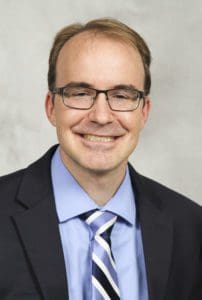Synod and eucharistic renewal: A time for courage, hope and prayer
By ANDY LICHTENWALNER | Published October 28, 2021
When the fathers of the Second Vatican Council sought to renew the liturgy, their chief concern was to encourage the full, active and conscious participation of all the faithful in the liturgy, knowing that the Eucharist is the source and summit of the church’s life and mission.
 Our Holy Father recently launched a two-year synod process involving the whole church, which will culminate in a Synod of Bishops meeting in Rome in the fall of 2023. Archbishop Hartmayer, along with brother bishops all over the world, launched the diocesan phase of synodal participation on Oct. 17.
Our Holy Father recently launched a two-year synod process involving the whole church, which will culminate in a Synod of Bishops meeting in Rome in the fall of 2023. Archbishop Hartmayer, along with brother bishops all over the world, launched the diocesan phase of synodal participation on Oct. 17.
The word “synodality” is admittedly a bit new, but it is referring to a long-standing and basic reality of the Catholic Church. Synod itself means together on the way (see Archbishop Hartmayer’s column from the Oct. 14 issue of The Georgia Bulletin for helpful background). We live out synodality in various ways, including first and foremost our eucharistic assemblies at Mass on Sundays, our structures of consultation in the church (e.g., parish councils, diocesan pastoral councils, advisory councils, etc.) and the church’s convening of important meetings or synods of bishops through history, with ecumenical councils being the most authoritative form.
So why does reflecting on synodality matter now?
A constant theme in recent magisterial teaching has been a strong recognition of the mission of the laity and the reality that every member of the church, laity and clergy, are active subjects of evangelization. None of us is meant to be on the sidelines of the church’s mission; we are meant to fully, consciously and actively participate. Each one of us, by virtue of our baptisms, has been anointed by the Holy Spirit and shares in Christ’s priestly, prophetic and kingly office. As a recent church document says, “Synodality means … that everyone in the church is a subject.”
Some natural questions arise here: How are we doing mission wise? Why is that so? Where do we go from here?
The numbers of baptized Catholics disaffiliating from the church is a symptom of something amiss, both among Catholics and in our society today. Challenges such as family breakdown, abuse and infidelity in the church, lack of trust in authority and ultimately the eclipse of God from society mark our time. Many have described our society as “post-Christian,” and Msgr. James Shea’s recent work “From Christendom to Apostolic Mission” describes this “change of the ages” well.
In view of the challenges we see in society and in the church, it can be tempting to look at this synodal journey with cynicism and even with some trepidation. But, if we look at it through the lens of Christian hope and with the realism of living in a new “apostolic age,” where we can no longer presume the supports of a Christian culture, perhaps this gives us reason to be more courageous and to entrust this synodal journey to the Lord. If we depend not on ourselves but on the Holy Spirit, and if we ground this synod in listening and discernment that derives from eucharistic contemplation and docility to the Holy Spirit, this can be a time of great fruitfulness.
Let us hope for that and do our part! In this year of eucharistic renewal, let us beg our eucharistic Lord to guide this synodal journey, that it may truly serve his will.
Please stay tuned for more information in the coming weeks on how to participate in the Synod. Go to www.archatl.com/synod to learn more.
Andrew Lichtenwalner is director of the Office of Evangelization and Discipleship.